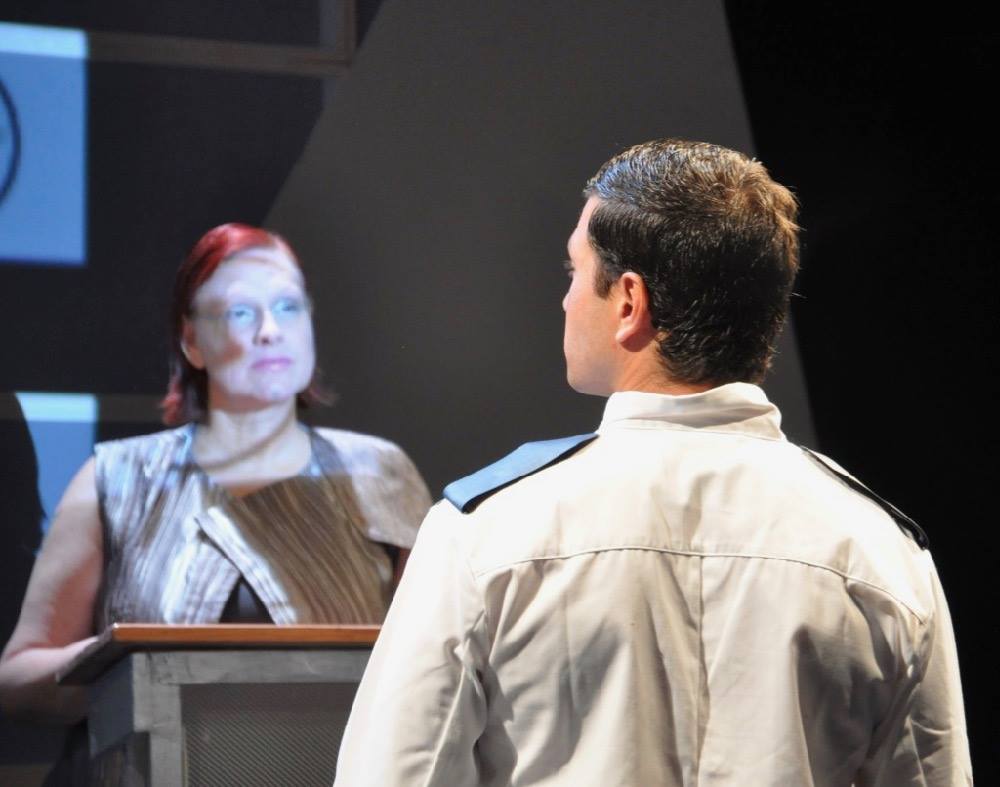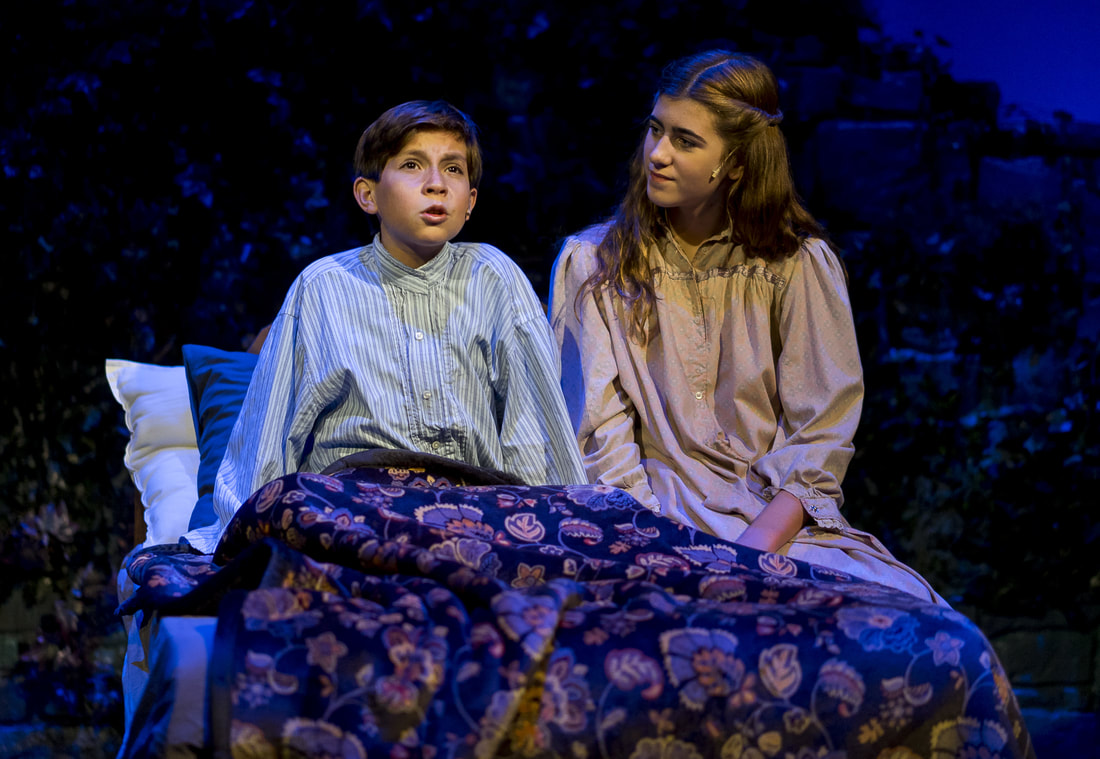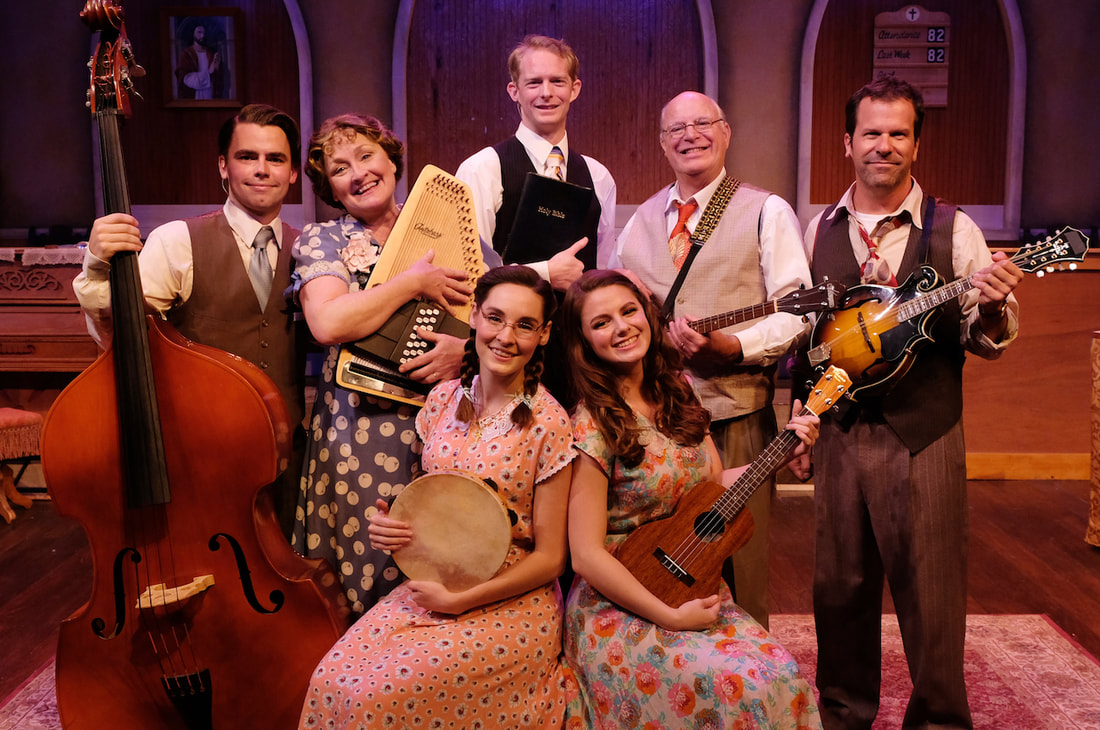|
Ariana DeBose (center) in "Summer: The Donna Summer Musical." Photograph by Jim Berne Beyond the lavishness of the world-premiere Summer: The Donna Summer Musical at La Jolla Playhouse is the fact, known long before this show was ever written, that Donna Summer was a remarkable talent. Only her association with the title “Queen of Disco,” which this production rightfully emphasizes was for Summer a double-edged sword, has deprived her from being considered a towering figure in more respected genres, such as R&B or even pop.
Summer is an expensive-looking and technologically sophisticated docu-musical constructed around the songs that defined Donna Summer. Many of them were written by Giorgio Moroder or Peter Bellotte, both of whom are portrayed in the show, or by Summer herself, who because of the singularity of her powerfully expressive voice was an underrated songwriter. This musical’s book was written by Colman Domingo, Robert Cary and Playhouse Director Emeritus Des McAnuff, who also directs. Though faithful to the facts of Summer’s turbulent life and career, it is overstuffed and relies on many of the “celebrity rise and fall” tropes so familiar in biographical musicals of this kind: the downside of fame, the struggle to find true love, balancing family and career, reliance on pills, et al. But Summer’s all-too-short life (she passed away at 63) had its share of pain and anguish, especially during her childhood church days, and that is not glossed over, but the storytelling takes a definite back seat to the music. Three women – Storm Lever (“Duckling Donna”), Ariana DeBose (“Disco Donna”) and LaChanze (“Diva Donna”) – portray Summer during various stages of her life, and impressively deliver her songs throughout. As for those songs, some are truncated or seem out of context, but hearing them again, over less than two hours, is frequently a stirring experience. Among them: “Last Dance,” “Hot Stuff,” “On the Radio,” “Bad Girls,” “MacArthur Park” (performed in a spine-tingling sequence), “Dim All the Light,” “She Works Hard for the Money” and, ‘natch, “Love to Love You Baby.” Choreography by Sergio Trujillo and a band conducted by Victoria Theodore add sizzle to Summer, which is best appreciated as a nostalgic concert. (Review originally published in San Diego CityBeat on 11/29/17.)
0 Comments
San Diego Musical Theatre’s Miracle on 34th Street (A Live Musical Radio Play) evidently was so successful last year when it debuted on the Horton Grand Theatre stage that SDMT has brought it back. Based on a 1947 Lux Radio Hour broadcast, this Miracle on 34th Street adapted by Lance Arthur Smith with original songs by Jon Lorenz remains a likable holiday treat. There are a couple of cast changes from last year, notably the addition of Tim West as Kris Kringle. West not only looks the part, but he’s delightfully low-key.
With brick-and-mortar department stores going the way of the dinosaur thanks to online shopping services, the ones who really ought to embrace this show are the people at Macy’s. Not only does the store figure prominently in the Miracle on 34th Street story, but also in a bunch of its songs. The U.S. Postal Service, another institution looking potential obsolescence in the eye thanks to digital technology, is also celebrated in this show (in “USPS Jingle”). All this aside, SDMT’s production is warm and family-friendly and altogether a merry reason to visit the Gaslamp Quarter through Dec. 24, when Miracle on 34th Street closes. That’s Christmas Eve, by the way. As with Johnna Adams’ Gidion’s Knot, a drama staged earlier this year in InnerMission Productions’ black box space in University Heights, Deanna Jent’s 2012 one-act play Falling is intense almost to the breaking point. The anxiety of its characters is quickly absorbed by the audience, resulting in an immersive theater experience.
Falling is the story of Josh, a severely autistic 18-year-old boy who cannot care for himself and who, because of his unpredictable aggressive behavior, proves even a physical threat to his family. This does not deter Tami and Bill, Josh’s loving parents, who meet the formidable moment-to-moment challenges of his care with sacrifice, patience and fortitude, even as the crushing helplessness of doing so imperils their marriage and each’s own emotional well-being. Also in the suburban household are Josh’s frightened and angry sister and a visiting Bible-toting grandmother who believes that prayers to the Almighty will somehow make everything right. Tami and Bill know that they won’t. D. Candis Paule and Steve Schmitz heroically portray Josh’s parents in InnerMission’s 80-minute production, with Alanna Serrano as the teen sister Lisa and Kathi Copeland playing Grammy Sue. Robert Malave brings dauntless focus, physicality and an undercurrent of innocence, too, to the remarkably complex role of Josh in a performance that never rests. Josh is disturbingly singing along to “Let’s Go Fly A Kite” from “Mary Poppins” one minute, then cowering, covering his ears and crying out because of a dog’s barking the next. Malave’s every sound and agitation reverberate in the tiny black box theater. Tautly directed by actress Samantha Ginn, who also works with autistic children and young adults, Falling is unsettling and uncomfortable to watch at times. The tension and uncertainty accompanying every interaction, no matter how seemingly routine, between Josh and his family are relentless. But the unselfish love exuded in Schmitz’s and especially Paule’s performances, along with Malave’s fearless commitment as autistic Josh, make an indelible impression. (Review originally published in San Diego CityBeat on 11/22/17.) The moors of 19th century literature are lonely and isolated, as enigmatic as the shifting fog that enshrouds them. Mystery and even danger inevitably await. They are also a “savage” place in Jen Silverman’s quasi-satiric play “The Moors,” which in one brazen act deconstructs any romantic sensibility instilled in them by the likes of the hallowed Bronte sisters. Diversionary Theatre’s production of “The Moors,” a West Coast premiere directed by Lisa Berger, is an antidote to the fulsome emotionalism of novels like “Wuthering Heights.” At the same time, it’s a subversive, at times bizarre, alternative to the holiday-oriented theater fare that will predominate the remainder of the year.
“The Moors” is set in “the 1840s-ish” according to the theater program, and Silverman’s expressive script makes every effort to suggest that its avowed truisms about power, desire and the respectable order of things are as cogent today as they were, or should have been, over a century ago. As in the sweeping tales of those bygone times, Silverman’s play takes place in a mysterious house on a bleak moor, where at the outset two spinster sisters, the domineering Agatha (Kim Strassburger, effecting icy) and mousey but manic Huldey (Hannah Logan) are preparing to welcome a governess to the premises. When Emily (Whitney Brianna Thomas) arrives, it is soon clear that the estate master who summoned her in come-hithering letters (the sisters’ brother) is missing, and more quixotic still, there is no child in need of a governess. There’s also a house maid (Gerilyn Brault) who may or may not be named Marjory or Mallory and who may be either with chronic cough or with child. All this before the real screws have been turned (that’s Henry James, not Bronte, but no matter) in “The Moors.” A “forbidden” love affair, a deadly conspiracy and a brutal murder are yet to come. When secrets fairly crying out to be confided are made known and simmering impulses are indulged, the tenor of “The Moors” turns comic and for all practical purposes to camp. Best served by this evolution of tone is Logan, whose portrayal of oppressed sister Huldey is frighteningly hilarious. Logan also is the beneficiary of the play’s spotlight moment, in which she goes full diva murderess. With minimal humor but no shortage of metaphor-making and weighty observation is a subplot relationship between the family mastiff dog (John DeCarlo, speaking as if imbued) and a wide-eyed moorhen (Rachel Esther Tate). The mastiff’s ominous courtship of the feathery tutu-clad hen takes place on the moor, which is suggested onstage by drawing a curtain over Kristen Flores’ Victorian set. Is this open-air liaison just more forbidden, foredoomed desire? Only playwright Silverman knows for sure. If the machinations of this 1840s-ish world defy explanation in deference to the latitude expected of dark comedy, then it’s all good with what goes on in this entertaining but confounding play. Or as sister Agatha says with cold, deadly-certain confidence about her moorland manor: “All things here are possible.” (Review originally published in San Diego Union-Tribune on 11/21/17.) Edward Watts (left) and Dan DeLuca in "Dr. Seuss' How the Grinch Stole Christmas!" at the Old Globe Theatre. Photo by Jim Cox There’s a new Grinch in town. Edward Watts, a musical-theater veteran whose credits include everything from The Most Happy Fella to The Book of Mormon, is starring in this year’s iteration of the Old Globe Theatre’s Dr. Seuss’ How the Grinch Stole Christmas! Watts boasts a kind of James Arness presence in the part, which works especially well in the sequence in which the Grinch is donning a Western hat and telling the Who’s that he’s from “Who-ston.” (As in Houston, in case you are one of the few San Diegans who haven’t seen this long-running holiday favorite.)
By the by, Dr. Seuss’ How the Grinch Stole Christmas! is now in its 20th year, which speaks well to the legacy of Theodor Seuss Geisel, to Timothy Mason and Mel Marvin who wrote the show’s book, lyrics and music, and to the Old Globe actors and creative artists who never take this yuletide treat for granted. It’s still undeniably fun, especially for the kiddies, but even a grown-up like me who’s seen the show eight to ten times can find plenty of reasons to laugh and enjoy. Let’s give some overdue credit to director James Vasquez, to musical director Elan McMahan, and to some of the ensemble who’ve been doing faithful Who duty for quite a few years: Steve Gunderson, Bets Malone, Robert J. Townsend, and Nancy Snow Carr, for instance. Dr. Seuss’ How the Grinch Stole Christmas! runs through Christmas Eve. It’s a daunting if not futile undertaking to attempt to freshen William Shakespeare’s Romeo and Juliet, so universally familiar is its premise and much of its quotable verse. It’s also the one work of The Bard of Avon’s that perhaps even Shakespeare-phobes have seen at least once. (Or else they’ve seen the definitive 20th-century reinterpretation that is West Side Story.) The Old Globe Theatre’s annual collaboration with the University of San Diego Shiley Graduate Theatre Program this year is Romeo and Juliet, and while this production doesn’t exactly freshen the tragedy about two mixed-up teenagers from Verona, it does instill it with both the impetuosity and runaway hormones of timeless adolescence.
To begin with, the production that runs through Nov. 19 has as its director Delicia Turner Sonnenberg, who earlier this year made her Old Globe directorial debut in this very Sheryl and Harvey White Theatre with the stirring drama Skeleton Crew. In addition to giving Romeo and Juliet’s young actors the latitude to set free their emotions and immerse themselves in the story, Turner Sonnenberg’s contemporary sensibility for the much-produced play is reflected in this production’s choice of music (which includes the Jackson 5), its tenor (rapier-witty until it turns requisitely tragic) and a pace as swift as the lengthy play will allow. Jose Martinez is a strident Romeo and Larica Schnell a highly strung Juliet, with each lover portrayed as a captive of first, passionate love and feeling absolutely entitled to it. That entitlement does not make their well-known untimely suicides any less grievous. Samantha Sutliff as Juliet’s brassy nurse and Eric Wellman as Romeo’s hotheaded crony Mercutio milk every moment they have on the little Shiley stage, while Renardo Charles Pringle Jr. balances sputtering and gravitas as poor Friar Lawrence, who tries in vain to facilitate Romeo and Juliet’s happiness. Bottom line, if this Romeo and Juliet gets college students, or even younger audience members, into the theater this fall then its jillioneth return to the stage will have been well worth it. (Review originally published in San Diego CityBeat on 11/15/17.) Donatella Soul and Arthur Wentworth in "American Carnage: A Love Story." Think of the futuristic society portrayed in director/playwright Aimee Greenberg’s “American Carnage: A Love Story” not as a Utopia, but a Dystopia. It’s a bloodless, remote-control world where clouds and trees no longer exist, where art is confined to a “Museum of Obsolete Media,” where artificial intelligence moves inexorably toward the subjugation of humankind.
All this is implied more than shown in the world premiere of Greenberg’s one-act play staged by her fruitlessmoon theatreworks company at the City Heights Performance Annex. Augmented by screen projections, startling sound effects and a few props, the cast of eight in “American Carnage” can only represent a microcosm of what this intellectually ambitious work is trying to say in just one act. True, there is a tattooed, toga-clad ruler called Coleigula (pronounced if not spelled like the depraved Roman emperor) who presides over the privileged techno-world that’s in power. But looming over his repressions and his sickness (“We are committed to the repopulation of the Caucasians!”) is more global, indeed more universal, commentary about loss of freedom, individuality and sentient feelings. It’s a tall order for 90 minutes of theater, and as such the narrative of “American Carnage: A Love Story” is delivered in mostly taut mini-scenes, periodically interrupted by cautionary reflections from Greenberg herself, as an unnamed cast member. This is not to say there aren’t focal characters. In fact, that’s where the love story comes in. YML (Arthur Wentworth) is a hybrid robot/human who is – not his words – “cursed with curiosity.” This leads him from his assigned vector to the Badlands, where the dissipating number of humans reside. His own human side having been incited at the Museum of Obsolete Media by exposure to the likes of Leoncavallo’s “Pagliacci” and Tony and Maria’s duet in “West Side Story,” YML makes an emotional connection with young Delilah (Alexandra Phillips), leading to his defying his creators, who would have her killed. Yet YML’s quest and his fate are but a layer of an over-layered script that could benefit from some refining. Within the play’s sweep are declarations about survival of the fittest (complete with stand-in for a Galapagos tortoise), Darwin, and genetic experimentation (pig men onstage). While expecting more from a love story between a human and a hybrid droid may be in itself counterintuitive, it’s clear that the heart of “American Carnage” is YML himself. Or would that be itself? Though somewhat restricted by the mere definition of his character, Wentworth is a sympathetic protagonist, particularly when he’s dabbing on his Pagliacci clown makeup or reciting for Delilah Tony’s half of “West Side Story’s” “Somewhere.” A few others in the ensemble wander toward performance-art territory, though that’s practically inescapable given the sharp pronouncements of the script and the stark Performance Annex setting. Even with its exorbitance of statements about what the future of men, women and machines may hold, “American Carnage: A Love Story” is an intelligent new work, and there’s nothing artificial about that. (Review originally published 11/14/17 in San Diego Union-Tribune.) Jacob Farry and Sara Mahaffey in "The Secret Garden." Photo by Daren Scott “The Secret Garden” stage musical resides in an ephemeral world where past and present converge, where the ghosts of lives interrupted by untimely death swirl and drift among the living. In their sphere is a young girl, Mary Lennox, who has lost her parents, and her hunchbacked uncle, Archibald Craven, who has lost his wife and seemingly his will to survive. The dark theatrical shadings of “The Secret Garden” musical that’s based on Frances Hodgson Burnett’s 1911 children’s book may be attributed to Marsha Norman, who wrote the 1991 show’s book and lyrics, and who’d earned a Pulitzer Prize eight years earlier for her devastating drama “’night, Mother.” Or it may be that in her and composer Lucy Simon’s Tony Award-winning retelling, the narrative’s focus shifted in large part from Mary to her uncle, in so doing heightening the tale’s complexity.
Regardless, “The Secret Garden” that opened Friday night at New Village Arts Theatre in Carlsbad under the direction of Rosina Reynolds is meaty storytelling in the Gothic tradition that only late in Act 2 flirts with emotive melodrama. An unhappy mansion in the Yorkshire of the early 20th century is the setting for this story of healing and personal reclamation. It’s there that Mary (newcomer Sara Mahaffey, making her professional debut) is sent to live with her despondent uncle (David S. Humphrey) after her parents die in a cholera outbreak. What – and who – she discovers at Misselthwaite Manor proves restorative and life-changing. The beauty of NVA’s production is in the fluid choreography by Nadia Guevara, whose ghostly chorus, or dreamers as they’re described in the script, are the touchstone presences on the stage. Musical director Tony Houck leads an excellent five-person mini-orchestra that delivers with feeling “The Secret Garden’s” persistently heartfelt score. The versatile Humphrey, whose turns this year range from the charismatic Professor Harold Hill in the Welk Resort Theatre’s “The Music Man” to the lecherous boss in San Diego Musical Theatre’s “9 to 5,” is “The Secret Garden’s” most compelling character. His “A Bit of Earth” and numbers with silken-voiced Samantha Rose Steinberg (as Archibald’s late wife, Lily) are tender and memorable. Mahaffey shows promise in the principal role of Mary, and while the shouting back and forth between her and Jacob Farry (as Archibald’s bedridden son Colin) borders on the shrill, she nicely inhabits Burnett’s heroine’s initial pouting petulance and her overriding curiosity. But Humphrey’s brooding but sympathetic Archibald is definitely missed in the long stretch in the second act without him. Costume designer Elisa Benzoni conveys well the look of Edwardian England, and New Village’s relatively small stage is rightly devoted to the garden wall and what may lie beyond it. “The Secret Garden” is lengthy (two hours, 20 minutes) and not without its superfluous, expository numbers, but like NVA’s production last year of “Big River,” it’s a significant achievement in staging musical theater for Executive Artistic Director Kristianne Kurner and the Carlsbad company now in its 17th season. (Review originally published in San Diego Union-Tribune on 11/13/17.) The cast of Lamb's Players Theatre's "Smoke on the Mountain." Photo by Daren Scott Connie Ray’s Smoke on the Mountain is one of the most widely produced shows out there, especially in rural American towns, and why not? It’s set in rural America, in 1938 at Mt. Pleasant Baptist Church in a North Carolina burg whose principal economic engine is the local pickle factory. This revival-meetin’ musical is also a favorite of Lamb’s Players Theatre, which has staged it on previous occasions but now for the first time at its current Coronado venue. This is the sort of theater-going experience where audience members are encouraged to clap along and stamp their feet.
There’s a loosely crafted “plot” about the Sanders family singers/players revving up the congregation at a church service presided over by the Rev. Mervin Oglethorpe (Brian Mackey). They arrive late after a bus mishap, but still in good humor and perpetually imbued with the spirit of the Good Book. The thin story’s one discernible conflict is the reverend’s mid-show disapproval of any dancing in his church, but this is resolved quickly, perhaps too quickly. The narrative could really be tossed out altogether, confining Smoke on the Mountain to its musical performances. Many of the songs are the kind that Andy Griffith favored back in Mayberry when the tone of his TV show turned spiritual, or of the knee-slapping variety typical of Baptist churches. The Sanders family, portrayed here by Rik Ogden, Beau Brians, Deborah Gilmour-Smyth, Annie Buckley and Katie Sapper, is all rather vanilla except for Steve Gouveia as Stanley Sanders, who brings a welcome brooding intensity to the party. Gouveia, who delivered a creepy tour de force earlier this year in Cygnet Theatre’s bodacious Shockheaded Peter, is Smoke on the Mountain’s one textured character. When he sings solo, he brings to mind the jagged edges of the great Steve Earle. His second-act monologue about a prisoner and a child is beautifully honest. And, in this show’s one departure from utter cleanliness, he gets to stomp off the stage muttering “Shit.” Not the wisest thing to do at Mt. Pleasant Baptist Church. (Review originally published in San Diego CityBeat on 11/8/17.) From the very start, the play Hand to God labors like hell to be shocking and irreverent, almost as if it sprung from a dramaturgical checklist on how to do so. Got enough f-bombs to make Eminem blush? Check. How about a bloody ear-biting reminiscent of Mike Tyson? Check. An explicit sex between two hand puppets? Check again.
The upshot is a two-act raunchapalooza that for all its induced “I can’t believe what I’m seeing” laughs, wears itself out long before the second-act finale. San Diego Repertory Theatre’s loud production is very much in tune with playwright Robert Askins’ sensibility that anything goes – including one hand puppet giving the other a hand job, and that’s not just a play on words. Director Sam Woodhouse’s cast is inexhaustible. As Jason, the awkward young man whose puppet called Tyrone is possibly possessed by Old Scratch, Caleb Foote is wonderfully schizophrenic. Next most impressive and equally skilled in physical comedy is DeAnna Driscoll as Jason’s mother Margery, who’s overseeing a hand puppet ministry (these do exist) at a determinedly devout Texas church. While her character’s motives for her wildly impulsive behavior are dubiously explained as grief-driven, Driscoll has a frenzied field day onstage. She’s a Texas tornado of spat expletives and carnal desire. But it’s hand puppet Tyrone’s show all the way, which makes this young Foote’s show. Imagine the devil-voice from “The Exorcist” mated with Andrew Dice Clay. While the things that spew from Tyrone’s “mouth” are purposely outrageous, they are inherently more benign than if spewed by a human character. Like the animated kids on “South Park” or the marionettes in “Team America: World Police,” Tyrone’s insurgent words or antics make an impact in large part because they’re NOT coming from a real person. They might be less funny if they were. In fact, nothing in the overdrawn Hand to God seems very real. Is that the point? Perhaps, but in any case it’s better to appreciate Hand to God as an R-rated spoof than as some Middle America-centric socio/religious observation. Footnote: The puppet consultant for Hand to God is a San Diego legend, master puppeteer Lynne Jennings. (Review originally published in San Diego CityBeat on 11/1/17.) |
AuthorDavid L. Coddon is a Southern California theater critic. Archives
July 2024
Categories |
David Coddon |
|




